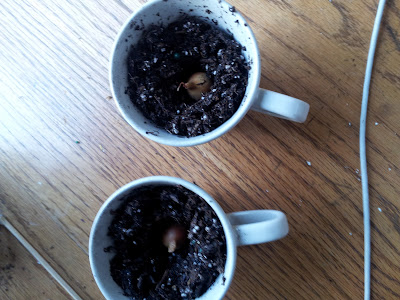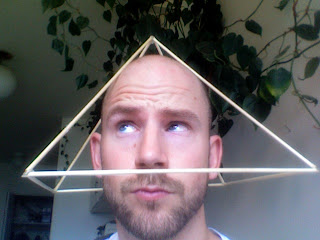Hello friends! I thought you might like to try your own pyramidology experiments, so I made a video that walks you through how to make a pyramid for your very own! Now you can conduct and your own experiments and witness the power for yourself!
Check out the video here:
http://www.youtube.com/watch?v=vW1x1cjMG6M&feature=plcp
What happens to a piece of fruit when placed under a pyramid? Or a plant? How do animals respond to a pyramid structure in their home? And what is the effect on the human body when one spends extended periods of time in a pyramid? In this blog, I plan on answering these questions. It is said that the flow of energy is channeled through a pyramid in a way that has many benefits to living things. We shall see.
Friday, November 9, 2012
Wednesday, November 7, 2012
Oh, by the way... (Onion Bulb Conclusion)
As you can see, the pyramid bulb dramatically blew the other guy out of the water! Poor little fella, you can see him poking his pathetic little face up out of the dirt as if to say, "go ahead, laugh at me." That'll do, onion, let's not get all dramatic...
A Force That Defies the Known Laws of Nature
The more I read about pyramidology, the more fascinated I become! While surfing, I found some amazing stuff at http://ed5015.tripod.com/PaPyramidology137.html
Here are my favorite paragraphs:
"A revised interest in pyramids came about this century when Karel Drbal, a Czecholslovak radio engineer, was inspired by experiments carried out by a Frenchman by the name of Monsieur Bovis. Bovis had discovered that animals that had wandered into the Great Pyramid and died, hadn't decayed, but had mummified. When he made a model of the Great Pyramid and put a dead cat inside, the same thing happened and he concluded that the pyramid shape stopped normal decay of organic matter. Further experiments showed that razor blades when put under a small pyramid regained their sharp edges. Drbal replicated these experiments which were so successful that he applied for a patent. The patent (No. 91304) was eventually issued by the patent office of the Czechoslovak Republic in 1959. If the experiment only works when a pyramid shape is used, we must ask why? Is some strange force unknown to man at work?"
I got goose bumps reading that! But wait there's more...
"In an effort to answer the question, American Scientists, members of the Atomic Energy Commission, the Smithsonian Institute, and the Ein Shams University in Cairo, conducted experiments with a machine developed by Dr Luis Alvarez, a Nobel prize-winner, to measure the passage of cosmic rays as they passed through another pyramid, the Chephren. The purpose was to X-ray the pyramid to see if there were any secret vaults inside. A detector placed inside would measure the cosmic rays as they passed through the structure and if there were any hollow areas the routes of the rays recorded on magnetic tape would indicate where they were. When the two-million ray tracks were analyzed using an IBM 1130 computer installed at the Ein Shams University, Dr. Amr Gohed, who was in charge of the installations at the pyramid site admitted that he was more than puzzled, 'nothing made sense, the patterns were never the same, it is scientifically impossible' he said, alleging that there is some force at work in the pyramid which defies the known laws of nature."
Gah! If that doesn't blow you away, then I don't know what will...
Here are my favorite paragraphs:
"A revised interest in pyramids came about this century when Karel Drbal, a Czecholslovak radio engineer, was inspired by experiments carried out by a Frenchman by the name of Monsieur Bovis. Bovis had discovered that animals that had wandered into the Great Pyramid and died, hadn't decayed, but had mummified. When he made a model of the Great Pyramid and put a dead cat inside, the same thing happened and he concluded that the pyramid shape stopped normal decay of organic matter. Further experiments showed that razor blades when put under a small pyramid regained their sharp edges. Drbal replicated these experiments which were so successful that he applied for a patent. The patent (No. 91304) was eventually issued by the patent office of the Czechoslovak Republic in 1959. If the experiment only works when a pyramid shape is used, we must ask why? Is some strange force unknown to man at work?"
I got goose bumps reading that! But wait there's more...
"In an effort to answer the question, American Scientists, members of the Atomic Energy Commission, the Smithsonian Institute, and the Ein Shams University in Cairo, conducted experiments with a machine developed by Dr Luis Alvarez, a Nobel prize-winner, to measure the passage of cosmic rays as they passed through another pyramid, the Chephren. The purpose was to X-ray the pyramid to see if there were any secret vaults inside. A detector placed inside would measure the cosmic rays as they passed through the structure and if there were any hollow areas the routes of the rays recorded on magnetic tape would indicate where they were. When the two-million ray tracks were analyzed using an IBM 1130 computer installed at the Ein Shams University, Dr. Amr Gohed, who was in charge of the installations at the pyramid site admitted that he was more than puzzled, 'nothing made sense, the patterns were never the same, it is scientifically impossible' he said, alleging that there is some force at work in the pyramid which defies the known laws of nature."
Gah! If that doesn't blow you away, then I don't know what will...
Sunday, August 19, 2012
The Onion Bulbs-- UPDATE!
Wowee zowee!!! Nine days ago, I planted two onion bulbs, placed one under my pyramid and one just next to it. I was delighted to see what happened!
I will be continuing to monitor the bulbs throughout growth and maturity. The next test will be the taste test! I read that a pyramid will enhance natural flavors, while artificial flavors become bland and tasteless. I'm curious to taste the difference between these two onions... super onion breath, here I come!
 |
| this is what I found on Aug 17th, 7 days after planting! |
 |
| Two days after the first sprouting. Bulb A is doing great! Bulb B... still waiting |
Friday, August 10, 2012
The Onion Bulbs
Welcome back! Observe with me as I test plant growth under a pyramid! For my next test, I have planted two onion bulbs in potting soil. For the sake of argument, bulb A (the one in the pyramid) is the slightly smaller of the two.
Stay tuned!
 |
| Two ordinary onion bulbs. |
 |
| Two ordinary onion bulbs in potting soil. |
 |
| And the test begins! I will update when I see some sprouts! |
Stay tuned!
Thursday, July 12, 2012
The Nectarine Experiment Concludes
Day 15:
It's been fifteen days since I started the nectarine experiment and to be honest, I expected more dramatic results. As you can see from the picture, they are both decomposing significantly, although half B is more shriveled. Also, something that could only be gleaned from viewing them in person is that half B has a high concentration of fruit flies congregating on it, whereas, half A has virtually none.
Two things I must point out:
1. After starting the experiment, I discovered that the pyramid must be facing the north star Polaris, which is slightly off true North read on a compass.
2. I had the angle slightly wrong and had to cut the top inch and 3/8 off the top of the pyramid and re-glue the apex.
Both these revelations occurred on day 6. I will start a new fruit experiment with my corrections, and will use an apple, but will do it in one post 15 days from now. In the meantime, stay tuned to see how a seed grows inside a pyramid! I'm thinking beans, since they grow fastest...
It's been fifteen days since I started the nectarine experiment and to be honest, I expected more dramatic results. As you can see from the picture, they are both decomposing significantly, although half B is more shriveled. Also, something that could only be gleaned from viewing them in person is that half B has a high concentration of fruit flies congregating on it, whereas, half A has virtually none.
Two things I must point out:
1. After starting the experiment, I discovered that the pyramid must be facing the north star Polaris, which is slightly off true North read on a compass.
2. I had the angle slightly wrong and had to cut the top inch and 3/8 off the top of the pyramid and re-glue the apex.
Both these revelations occurred on day 6. I will start a new fruit experiment with my corrections, and will use an apple, but will do it in one post 15 days from now. In the meantime, stay tuned to see how a seed grows inside a pyramid! I'm thinking beans, since they grow fastest...
Monday, July 2, 2012
Pyramid Power: Magic or Science?
In
recent years, Pyramidology has experienced a resurgence
in popularity. The pyramid shape itself is being seen as a supernatural
source of power or energy. The pyramid power has become the primary focus of
everything from veterinarian concerns to extraterrestrial
messages!
It's hard to believe that what has been alleged to have happened inside a pyramid has actually happened, unless you've been there to see it (which is why I'm conducting my own experiments!). I can see why when people see the word "supernatural", they lose a bit of faith in the idea, but what the pyramid does is it put things back the way they are supposed to be, on an elemental level. In other words, it makes things more perfect. The one frequency that is common with all elements is the carrier wave. The vector angle of energy formed by the carrier wave frequency is 52.606º. This is why we can build a pyramid out of any material and it will work, as long as the angle is observed correctly! The elements in the material used for the pyramid actually start to oscillate! So there's a little science for the skeptics!
The Nectarine
The first experiment I have chosen to put to the test is the fruit experiment. What will happen to each half of the same piece of fruit, one in a pyramid structure, one outside the structure. It is said that the fruit in the pyramid will stay fresh 2-3 times longer! Keep in mind, the structure is simply made up of 8 sticks of equal length and both halves are exposed to the open air.
For this experiment, I have selected a nectarine...
For this experiment, I have selected a nectarine...
 |
| Day 2. There is slight browning starting to happen on both halves... |
 |
| Day 3. I'm starting to get skeptical, as they are both browning at an almost identical rate (although it's still too early to tell...) |
 |
| Day 4. This is exciting! Clearly, the edges of half B are starting to curl, whereas, the edges of half A are not! |
 |
| Day 5. By looking carefully at half B, you can see the beginnings of mold. The edges of half A are starting to curl, but not to the degree that those of half B were, even yesterday! |
Subscribe to:
Comments (Atom)






